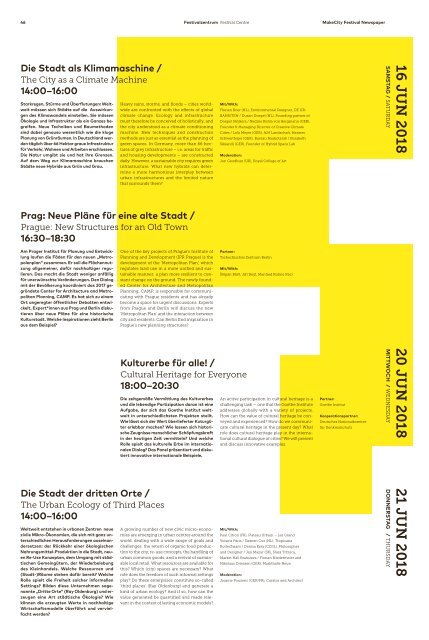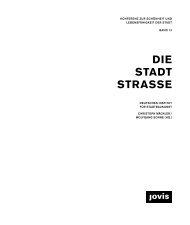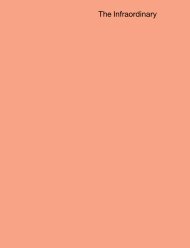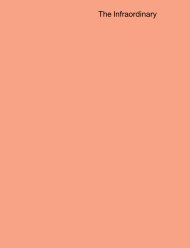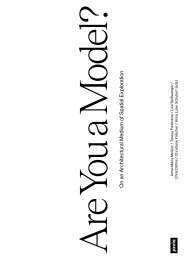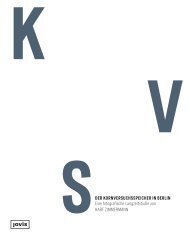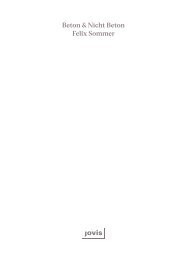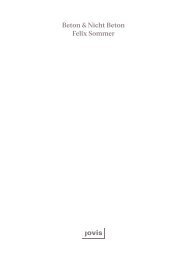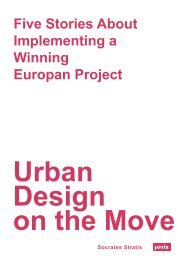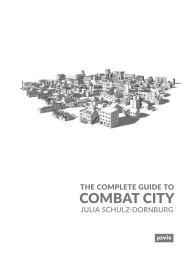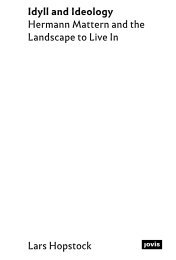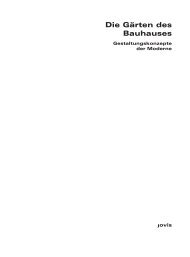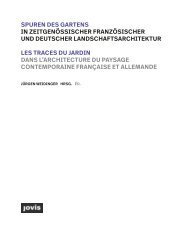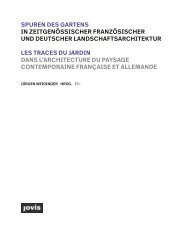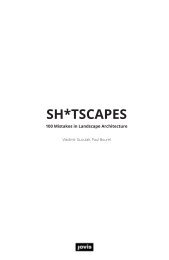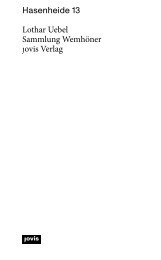Make City 2018 Festival - Newspaper
You also want an ePaper? Increase the reach of your titles
YUMPU automatically turns print PDFs into web optimized ePapers that Google loves.
46 <strong>Festival</strong>zentrum <strong>Festival</strong> Centre<br />
<strong>Make</strong><strong>City</strong> <strong>Festival</strong> <strong>Newspaper</strong><br />
Die Stadt als Klimamaschine /<br />
The <strong>City</strong> as a Climate Machine<br />
14:00–16:00<br />
Starkregen, Stürme und Überflutungen: Weltweit<br />
müssen sich Städte auf die Auswirkungen<br />
des Klimawandels einstellen. Sie müssen<br />
Ökologie und Infrastruktur als ein Ganzes begreifen.<br />
Neue Techniken und Baumethoden<br />
sind dabei genauso wesentlich wie die kluge<br />
Planung von Grünräumen. In Deutschland werden<br />
täglich über 66 Hektar graue Infrastruktur<br />
für Verkehr, Wohnen und Arbeiten erschlossen.<br />
Die Natur umgibt sie und hat ihre Grenzen.<br />
Auf dem Weg zur Klimamaschine brauchen<br />
Städte neue Hybride aus Grün und Grau.<br />
Heavy rains, storms, and floods – cities worldwide<br />
are confronted with the effects of global<br />
climate change. Ecology and infrastructure<br />
must therefore be conceived of holistically, and<br />
the city understood as a climate conditioning<br />
machine. New techniques and construction<br />
methods are just as essential as the planning of<br />
green spaces. In Germany, more than 66 hectares<br />
of grey infrastructure – i.e. areas for traffic<br />
and housing developments – are constructed<br />
daily. However, a sustainable city requires green<br />
infrastructure. What new hybrids can determine<br />
a more harmonious interplay between<br />
urban infrastructures and the limited nature<br />
that surrounds them?<br />
Mit/With:<br />
Florian Boer (NL), Environmental Designer, DE UR-<br />
BANISTEN / Duzan Doepel (NL), Founding partner of<br />
Doepel Strijkers / Nadine Kuhla von Bergmann (GER),<br />
Founder & Managing Director of Creative Climate<br />
Cities / Lola Meyer (GER), A24 Landschaft, Hannes<br />
Schwertfeger (GER), Bureau Baubotanik / Elisabeth<br />
Sikiaridi (GER), Founder of Hybrid Space Lab<br />
Moderation:<br />
Jon Goodbun (UK), Royal College of Art<br />
SAMSTAG / SATURDAY<br />
16 JUN <strong>2018</strong><br />
Prag: Neue Pläne für eine alte Stadt /<br />
Prague: New Structures for an Old Town<br />
16:30–18:30<br />
Am Prager Institut für Planung und Entwicklung<br />
laufen die Fäden für den neuen „Metropolenplan“<br />
zusammen. Er soll die Flächennutzung<br />
allgemeiner, dafür nachhaltiger regulieren.<br />
Das macht die Stadt weniger anfällig<br />
für unerwünschte Veränderungen. Den Dialog<br />
mit der Bevölkerung koordiniert das 2017 gegründete<br />
Center for Architecture and Metropolitan<br />
Planning, CAMP. Es hat sich zu einem<br />
Ort angeregter öffentlicher Debatten entwickelt.<br />
Expert*innen aus Prag und Berlin diskutieren<br />
über neue Pläne für eine historische<br />
Kulturstadt. Welche Inspirationen zieht Berlin<br />
aus dem Beispiel?<br />
One of the key projects of Prague's Institute of<br />
Planning and Development (IPR Prague) is the<br />
development of the ‘Metropolitan Plan’, which<br />
regulates land use in a more unified and sustainable<br />
manner: a plan more resilient to constant<br />
change on the ground. The newly founded<br />
Center for Architecture and Metropolitan<br />
Planning, CAMP, is responsible for communicating<br />
with Prague residents and has already<br />
become a space for urgent discussions. Experts<br />
from Prague and Berlin will discuss the new<br />
‘Metropolitan Plan’ and the interaction between<br />
city and residents. Can Berlin find inspiration in<br />
Prague’s new planning structures?<br />
Partner:<br />
Tschechisches Zentrum Berlin<br />
Mit/With:<br />
Štěpán Bärtl, Jiří Deyl, Manfred Kühne (tbc)<br />
Kulturerbe für alle! /<br />
Cultural Heritage for Everyone<br />
18:00–20:30<br />
Die zeitgemäße Vermittlung des Kulturerbes<br />
und die lebendige Partizipation daran ist eine<br />
Aufgabe, der sich das Goethe Institut weltweit<br />
in unterschiedlichsten Projekten stellt.<br />
Wie lässt sich der Wert überlieferter Kuturgüter<br />
erlebbar machen? Wie lassen sich historische<br />
Zeugnisse menschlicher Schöpfungskraft<br />
in der heutigen Zeit vermitteln? Und welche<br />
Rolle spielt das kulturelle Erbe im internationalen<br />
Dialog? Das Panel präsentiert und diskutiert<br />
innovative internationale Beispiele.<br />
An active participation in cultural heritage is a<br />
challenging task — one that the Goethe Institute<br />
addresses globally with a variety of projects.<br />
How can the value of cultural heritage be conveyed<br />
and experienced? How do we communicate<br />
cultural heritage in the present day? What<br />
role does cultural heritage play in the international<br />
cultural dialogue of cities? We will present<br />
and discuss innovative examples.<br />
Partner:<br />
Goethe Institut<br />
Kooperationspartner:<br />
Deutsches Nationalkomitee<br />
für Denkmalschutz<br />
MITTWOCH / WEDNESDAY<br />
20 JUN <strong>2018</strong><br />
Die Stadt der dritten Orte /<br />
The Urban Ecology of Third Places<br />
14:00–16:00<br />
Weltweit entstehen in urbanen Zentren neue<br />
zivile Mikro-Ökonomien, die sich mit ganz unterschiedlichen<br />
Herausforderungen auseinandersetzen:<br />
der Rückkehr einer ökologischen<br />
Nahrungsmittel-Produktion in die Stadt, neuen<br />
Re-Use Konzepten, dem Umgang mit städtischen<br />
Gemeingütern, der Wiederbelebung<br />
des Kleinhandels. Welche Ressourcen und<br />
(Stadt-)Räume stehen dafür bereit? Welche<br />
Rolle spielt die Freiheit solcher informellen<br />
Settings? Bilden diese Unternehmen sogenannte<br />
„Dritte Orte“ (Ray Oldenburg) und erzeugen<br />
eine Art städtische Ökologie? Wie<br />
können die erzeugten Werte in nachhaltige<br />
Wirtschaftsmodelle überführt und vervielfacht<br />
werden?<br />
A growing number of new civic micro-economies<br />
are emerging in urban centres around the<br />
world, dealing with a wide range of goals and<br />
challenges: the return of organic food production<br />
to the city, re-use concepts, the handling of<br />
urban common goods, and a revival of sustainable<br />
local retail. What resources are available for<br />
this? Which (city) spaces are necessary? What<br />
role does the freedom of such informal settings<br />
play? Do these enterprises constitute so-called<br />
‘third places’ (Ray Oldenburg) and generate a<br />
kind of urban ecology? And if so, how can the<br />
value generated be quantified and made relevant<br />
in the context of lasting economic models?<br />
Mit/With:<br />
Paul Citron (FR), Plateau Urbain – Les Grand<br />
Voisins Paris / Siemen Cox (NL), Tropicana<br />
RotterZwam / Denisa Kera (CZ/IL), Philosopher<br />
and Designer / Jan Mazur (SK), Stará Tržnica,<br />
Market Hall Bratislava / Florian Niedermeier and<br />
Nikolaus Driessen (GER), Markthalle Neun<br />
Moderation:<br />
Joanne Pouzenc (GER/FR), Curator and Architect<br />
DONNERSTAG / THURSDAY<br />
21 JUN <strong>2018</strong>


